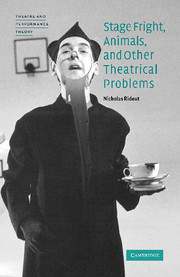4 - Mutual predicaments: corpsing and fiasco
Published online by Cambridge University Press: 04 December 2009
Summary
Laughter
Laughter may seem like a strange phenomenon to include among such anomalies and alien bodies as stage fright, embarrassment and animals. Is not the restorative power of communal laughter one of those things that most theatre at least sometimes seeks to produce or achieve? One might also complain that laughter itself has already been sufficiently recuperated, even elevated to a philosophical practice, by writers as distinct from one another and as influential as Mikhail Bakhtin and Friedrich Nietzsche. In fact, such is the coercive power of canonical hilarity that the kind of writer who doesn't like eye contact in the theatre is more or less honour bound to sit silently, arms folded in his seat, as his companions split their sides at the mirth-inducing antics of the clowns and the comedians, warming his chilly soul with Howard Barker's grumpy observations that ‘the carnival is not the revolution’, and that ‘the baying of an audience in pursuit of unity is a sound of despair’.
But it is not an affirmative, joyous laughter, the laughter of subversion and unashamed delight in the pleasures of the grotesque that is at stake here. Instead, it is to minor forms of laughter, laughter that is not improper on the grand political scale, but improper in the more local sense of being unwanted, untimely and in the wrong place, that our attention now must turn.
- Type
- Chapter
- Information
- Stage Fright, Animals, and Other Theatrical Problems , pp. 129 - 160Publisher: Cambridge University PressPrint publication year: 2006



